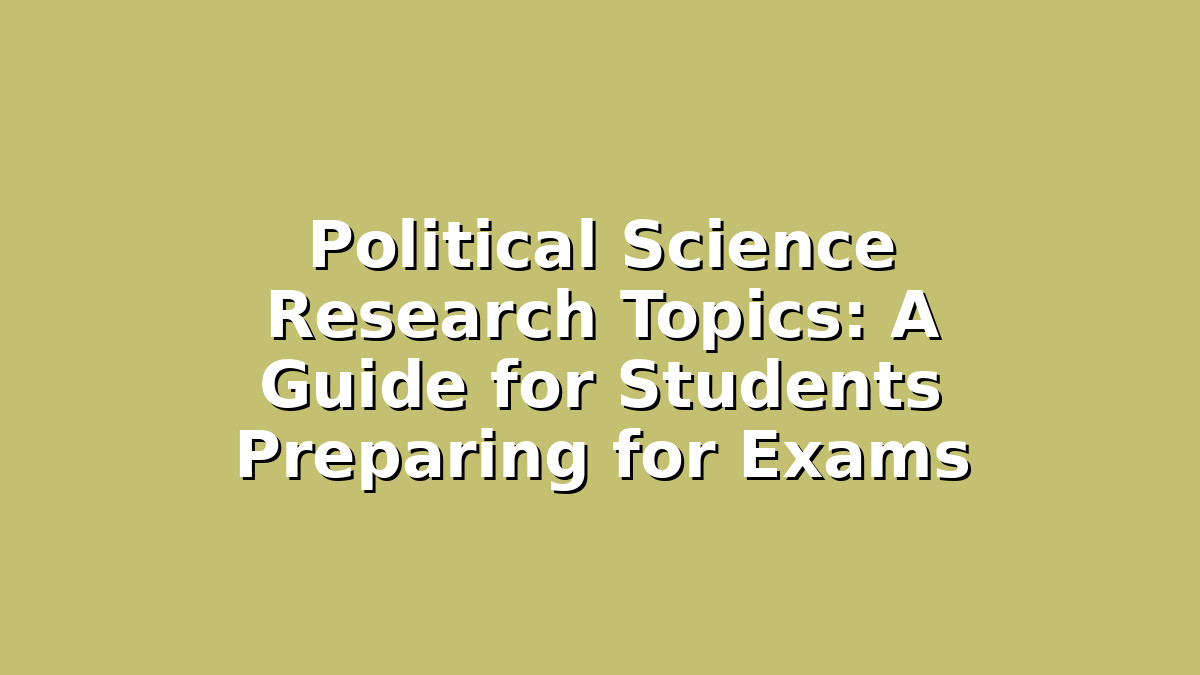Studying political science offers a fascinating glimpse into the structures, ideas, and forces that shape our world. Whether you’re preparing for exams, working on a research paper, or simply looking to deepen your understanding, selecting the right research topic is a crucial first step. A well-chosen topic not only sparks your interest but also helps you engage more deeply with course material, develop critical thinking skills, and prepare effectively for assessments.
In this article, we’ll explore a range of compelling political science research topics, along with practical study tips tailored to students preparing for exams. Our goal is to help you feel confident and motivated as you tackle your coursework and research projects.
Section 1: Choosing the Right Political Science Research Topics
Selecting a research topic can feel overwhelming, especially when confronted with the vastness of political science as a field. To make this process manageable, focus on areas that interest you and align with your course objectives. Here are some popular categories and ideas to consider:
– Government Systems and Comparative Politics
Topics such as federalism vs. unitary systems, democracy vs. authoritarianism, or the role of political parties in different countries provide rich ground for study. For example:
– “Comparative Analysis of Parliamentary and Presidential Systems”
– “The Impact of Political Parties on Electoral Outcomes in Developing Democracies”
– International Relations and Global Politics
If you’re intrigued by global affairs, look into topics like international organizations, diplomacy, conflict resolution, or global governance. Some ideas include:
– “The Role of the United Nations in Peacekeeping Missions”
– “Analyzing the Causes and Consequences of Trade Wars”
– Political Theory and Ideologies
Delve into the foundational ideas that shape political systems, such as liberalism, socialism, conservatism, or feminism. Potential topics:
– “The Influence of John Locke’s Ideas on Modern Democracy”
– “Feminist Political Theory and Its Impact on Policy Development”
Study Tip: When narrowing down your topic, ensure it’s neither too broad nor too narrow. A well-defined question will help you focus your research and structure your exam responses effectively.
Section 2: Effective Study Strategies for Political Science Exams
Once you have your research topic, the next step is organizing your study time to maximize retention and understanding. Political science covers complex theories and real-world events, so a strategic approach will serve you well.
– Create a Study Schedule
Break down your syllabus into manageable sections, dedicating specific days to different topics or themes. For example, assign one day to study political ideologies and another to international relations. This approach reduces overwhelm and ensures comprehensive coverage.
– Use Active Learning Techniques
Passive reading is rarely enough. Engage with the material by summarizing key points in your own words, creating flashcards for important terms, or teaching concepts to a study group. For example, explaining the differences between authoritarian regimes and democracies to peers can reinforce your understanding.
– Practice Past Exam Questions
Applying your knowledge to exam-style questions helps familiarize you with question formats and time constraints. Many universities publish past papers or sample questions—use these as practice to improve your analytical writing and time management.
Study Tip: Incorporate current events into your study routine. Political science is dynamic, so connecting theories to recent news stories or political developments can deepen your insight and make your exam answers more relevant.
Section 3: Writing Research Papers and Preparing for Presentations
In addition to exams, political science students often need to write research papers or deliver presentations. Excelling in these areas can boost your overall grade and exam confidence.
– Research Efficiently
Use academic databases such as JSTOR, Google Scholar, and your university library to find credible sources. Take careful notes, recording citations as you go, which will save time during the writing process. When researching political theories or case studies, prioritize peer-reviewed articles and authoritative books.
– Structure Your Paper Clearly
A typical political science paper includes an introduction (with a clear thesis statement), a literature review, methodology (if applicable), analysis, and a conclusion. Organize your arguments logically and support each point with evidence. Avoid jargon, and aim for clarity.
– Prepare for Presentations with Confidence
If your course requires oral presentations, practice is key. Develop a clear outline, use visual aids like slides, and rehearse your delivery multiple times. Anticipate potential questions from classmates or instructors and prepare thoughtful responses. Presenting your research can also reinforce your grasp of the material ahead of exams.
Study Tip: Seek feedback from professors or peers on your drafts and presentations. Constructive criticism will help you refine your arguments and improve your communication skills.
Conclusion
Political science is a captivating discipline that challenges you to think critically about governance, power, and society. Choosing the right research topics aligned with your interests and exam goals can make your study experience more meaningful and effective. By adopting organized study habits, engaging actively with course content, and honing your research and presentation skills, you’ll be well on your way to academic success.
Remember, preparation is a journey. Be patient with yourself, stay curious, and embrace the learning process. Your hard work will pay off not just in exams, but in your broader understanding of the world around you.
Good luck with your studies!

Responses